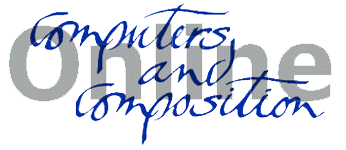Winter 2013 - Editor's Welcome
Typically, Computers and Composition Online publishes two issues per academic year since our first BGSU-hosted issue in Spring 2003, a fact that is itself a testament to the role of the journal as an intellectual and experimental space for multimodal composing. This year, we are fortunate to be able to publish a third issue (Winter 2013) that, although it features a range of teacher-scholars from around the country, also showcases our local community of doctoral students in the BGSU Rhetoric and Writing Program. Given BGSU’s contribution in sustaining the Computers and Composition Online community, this seems entirely fitting and is indeed a point of pride for me both as editor and as a faculty member.
Our Theory into Practice features Amanda Athon’s “Multimodal Composing as a Tool to Foster Language Diversity.” Athon powerfully argues that “the rise of homogenous, linear texts in the classroom likely coincides with the emergence of standard academic English as the most valued dialect and the language that permeates our college composition classrooms.” As Athon calls for more pedagogical innovation, Allison Carr, Hannah Rule, and Kathryn Taylor’s “Literacy in the Raw: Collecting, Sharing, and Circulating Graduate Literacy Narratives” documents how equally complex it is for graduate students new to the discourse community of rhetoric and writing to navigate a broad range of literate activities. For these authors, “digital space and online interaction in the form of an interactive archival space represents one way to facilitate the circulation and responsivity we find so integral to the ways literacy happens in the context of graduate school.” This concept of space also extends to Thomas Patrick Henry’s “Towards a Technological Theory of Eportfolios: Text and Media,” as he applies a range of theoretical frameworks to help computers and composition specialists understand the possibilities and constraints of eportfolios as both assessment and professional development tools. As Henry stresses, eportfolios exist “as tools for our use…helping us to create new cultural systems that may in fact help to restructure the teaching of composition.”
The Virtual Classroom contains two webtexts profiling very different digital contexts. First, Ghanashyam Sharma’s “Digital Storytelling in the Composition Classroom: Addressing the Challenges” contends that, despite the popularity of digital storytelling initiatives in higher education, “challenges of defining, teaching, and assessing this form of multimodal composition still persist in our discipline.” Sharma thus models a useful assessment rubric for these and other types of digital narratives, calling for further definition and development of digital storytelling genres within computers and composition theory and practice. Meanwhile, Matthew Vetter’s “Composing with Wikipedia: A Classroom Study of Online Writing” presents the results of a study of Vetter’s writing students who composed new or revised existing Wikipedia entries. Vetter concludes that regardless of the overly technomanic vs. technophobic positions on Wikipedia, asking “students to write in online venues like Wikipedia provide multiple opportunities for students to gain knowledge about writing processes; to engage with real, motivational audiences; and to experience writing as a social-collaborative act, all while fulfilling traditional course competencies.”
Our Professional Development section includes three sets of interviews conducted by our very own rhetoric and writing doctoral students. First, in “Archiving the Literacy Narratives of Our Times: An Interview with Dr. Cynthia Selfe and Dr. H. Lewis Ulman,” Megan Adams chronicles the historical evolution and disciplinary significance of the Digital Archive of Literacy Narratives (DALN). Closely related is Estee Beck and Matthew Bridgewater’s “Perspectives on First-Year Writing and Technology: An Interview with Christine Tulley.” As Director of First-Year Writing at the University of Findlay, Tulley has contributed to the DALN and has attended the Digital Media and Composition Institute at OSU, which has played an instrumental role in the multimodal curriculum development at the University of Findlay. Finally, I was honored to be part of this section via Heather Trahan’s “Past, Present, and Future(s): An Interview with Editor Kristine Blair,” where I discuss the important mentoring role of both Cynthia Selfe and Gail Hawisher and the ways their collaborative leadership has impacted the editorial administration of both Computers and Composition and Computers and Composition Online.
We conclude this issue with a strong set of reviews. First, Megan Adams showcases John Scenters-Zapico’s Generaciones' Narratives: The Pursuit and Practice of Traditional & Electronic Literacies on the U.S.-Mexico Borderlands, published by the Computers and Composition Digital Press. Scenters-Zapico’s book, as with the other compelling CCDP projects, clearly documents the affordances of new media composing. Equally significant is Jessica Edwards’ review of Adam Banks’ Digital Griots: African American Rhetoric in a Multimedia Age, where she highlights the importance role of Banks’ work in establishing African American rhetorical traditions that “benefit all students who may desire a better understanding of the many cultural influences on multimedia writing and literacy in our society.” Our third contribution is Jenna Pack’s review of BGSU alumni Toby Coley’s Teaching with Digital Media in Writing Studies: An Exploration of Ethical Responsibilities, with Pack commending Coley for reminding us “that we need to teach students about audience awareness, critical computer literacy, rhetorical principles, and academic integrity—in particular, we should show them how these concerns apply to their compositions in digital spaces.”
I continue to be honored to work with such a talented team of current and former students at Bowling Green who make Computers and Composition Online a true digital scholarly collective. I especially want to acknowledge Senior Editor Joe Erickson, who does double duty as Book Review Editor for Computers and Composition print, and to Megan Adams, who has played an instrumental role in our technical editing for the last several issues. We hope you enjoy the issue and encourage you to check back in mid-spring for our joint Computers and Composition print and online special issue “Deploying 21st Century Writing on the Economic Frontlines,” guest edited by BGSU Rhetoric and Writing alumni Lanette Cadle and Elizabeth Monske.


